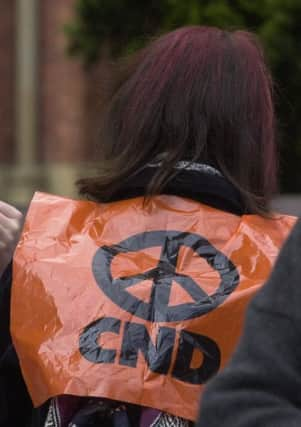Column: Now is the time to speak out about peace-building


Priestley’s article mentioned Aneurin Bevan’s speech at the 1957 Labour Party conference when, in reference to nuclear weapons, he asked delegates not to confuse ‘an emotional spasm’ with ‘statesmanship’. Priestley commented that “statesmanship of the last 10 years has produced little else but emotional spasms”. Now, 60 years on, we find ourselves in a world where certain national leaders are exhibiting dangerous ‘emotional spasms’ including the threat to use nuclear weapons, whatever the consequences.
Unfortunately, a misplaced understanding of ‘statesmanship’ has also resulted in successive UK governments retaining nuclear weapons as a symbol of power, to replace a lost empire.
Advertisement
Hide AdAdvertisement
Hide AdFor part of the late 1970s I was working at the Ministry of Defence in London when I came to the conclusion that the world was heading for nuclear disaster. The government’s continued faith in the theory of deterrence is a huge risk and we have seen that it does not stop wars. I was also questioning the ethics of threatening to wipe out millions of civilians with weapons of mass destruction and the possibility it could happen by accident or in the heat of the moment as international tensions rise. Then there’s the huge waste of money, when so much is needed elsewhere. The Cold War was at its coldest and the peace movement were making sense to me so I left the MoD and joined CND.
When that Cold War ended people thought that nuclear weapons had gone away but there are now some 15,000 nuclear warheads poised, ready to be used - each with an explosive power many times that of the bombs that devastated Hiroshima and Nagasaki in 1945, killing hundreds of thousands of people. Despite signing the 1970 Nuclear Non-Proliferation Treaty, which commits all signatories to negotiate in good faith towards the cessation of the nuclear arms race and to nuclear disarmament, no real progress has been made. In fact, in 2016 the UK parliament voted to spend over £204 billion to replace the Trident submarine-based nuclear weapon system. And the United States is set to spend over $1 trillion (a million million!) on new nuclear weapons and the other nuclear weapons states are also upgrading their weapons systems.
More worrying, perhaps, is the fact that the new generations of nuclear weapons are being developed to be more than just a threat. They are being made more accurate and some will be smaller than previous versions, and thus more likely to be used. The recently released US military posture review advocates using nuclear weapons, even in response to ‘significant’ non-nuclear attacks and nuclear weapons remain in the defence policies of all the main political parties in the UK except the Greens.
However, there are signs of hope. Inspired by the tens of thousands of members of the International Campaign to Abolish Nuclear Weapons (ICAN), many of the non-nuclear states established a treaty at the United Nations to prohibit the production, possession and use of nuclear weapons. Although the nine nuclear weapon states refused to participate in the negotiation process, a majority of the rest, 122, agreed on the terms of the treaty last July and it opened for signatures in September. Working together, civil society and non-nuclear weapon states have given us a way forward, to ensure our survival.
Advertisement
Hide AdAdvertisement
Hide AdSo, as some governments return to traditional and ineffective methods of hard power, now more than ever we need to speak out strongly about peace building and the use of diplomacy, at which the UK excels. We are ideally placed to make a huge difference, we have only a few nuclear weapons compared with the US or Russia but, in the 60 year-old words of Priestley - although “our bargaining power is slight; the force of our example might be great”. We need the courage to take the first step and set an example by scrapping the Trident programme. It might not be easy but as Priestley added: “getting out of the water may be difficult, but it’s better than drowning.”